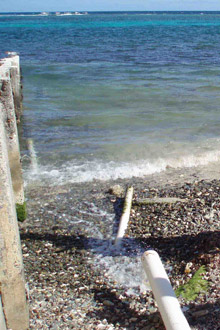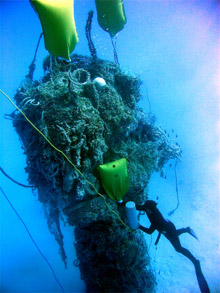How Pollution Affects Coral Reefs
In the coming years, remote coral reef ecosystems will be impacted primarily by global environmental changes. Reefs in close proximity to human populations, however, will also be faced with local stresses, including poor water quality from land-based sources of pollution.
Land-based Pollution Sources

Runoff from this pipe in the U.S. Virgin Islands spews directly into the ocean only a few hundred yards from reefs. Click image for larger view and image credit.
Pollution from land-based sources is a primary cause of coral reef degradation throughout the world. In the Caribbean, for example, approximately 80 percent of ocean pollution originates from activities on land. As human populations expand in coastal areas, development alters the landscape, increasing runoff from land. Runoff often carries large quantities of sediment from land-clearing, high levels of nutrients from agricultural areas and sewage outflows, and pollutants such as petroleum products and pesticides. These land-based sources of pollution threaten coral reef health.
Excess nutrients result in poor water quality, leading to decreased oxygen and increased nutrients in the water (eutrophication). This can lead to enhanced algal growth on reefs, crowding out corals and significantly degrading the ecosystem. In addition, sediment deposited onto reefs smothers corals and interferes with their ability to feed and reproduce. Finally, pesticides interfere with coral reproduction and growth. Sewage discharge and runoff may also introduce pathogens into coral reef ecosystems. For example, Aspergillus sydowii has been associated with a disease in sea fans, and Serratia marcescens, has been linked to white pox, another coral disease.
Marine Debris

A NOAA scientist removes derelict fishing gear from the reefs of Pearl and Hermes Atoll. Click image for larger view and image credit.
Marine debris also affects reefs in many areas. Marine debris is any human-made object that is discarded, disposed of, or abandoned that enters coastal and ocean waters. Debris may enter directly from a ship or indirectly when washed out to sea via rivers, streams, and storm drains. Hundreds of human-made items end up as marine debris, including plastics (from bags to balloons, hard hats to fishing line), glass, metal, rubber (millions of tires!), and even entire vessels.
Plastic debris kills several reef species. Derelict (abandoned) fishing nets and other gear—often called "ghost nets" because they still catch fish and other marine life despite being abandoned—can entangle and kill reef organisms and break or damage reefs. Even remote reef systems suffer the effects of marine debris. The Northwestern Hawaiian Island reefs are particularly prone to the accumulation of marine debris because of their central location in the North Pacific gyre. From 2000 to 2006, NOAA and partners removed over 500 tons of marine debris from the Northwestern Hawaiian Islands.
Related Web Sites
